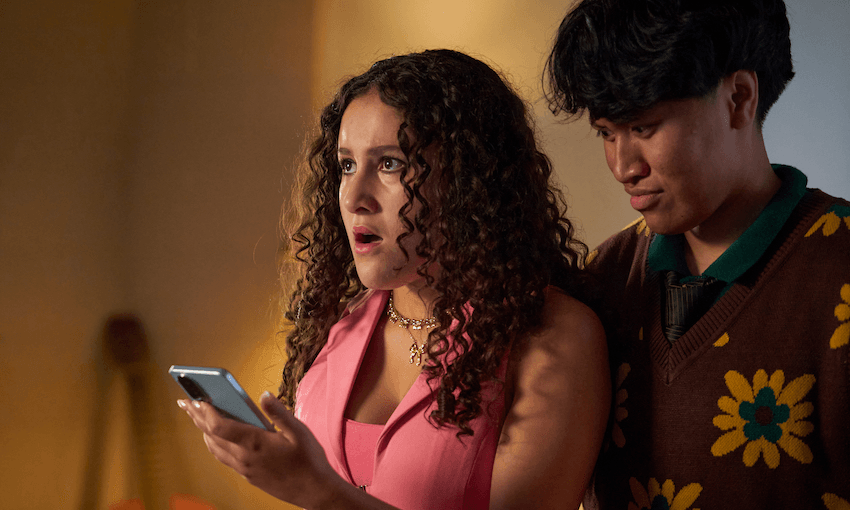Alex Casey talks to Jess Todd and Liv McClymont, the creative team behind scandalous new social media series The Sender.
On one of the final rounds of script feedback, millennial filmmakers Jess Todd and Liv McClymont received a crucial last minute note from their group of Gen Z advisors. “They were like, ‘it’s really good, but we only really say the word suss ironically now – it’s changed in the past month’,” laughs McClymont. “Things change really quickly with Gen Z. They think quickly, they act quickly, and hopefully that is reflected in the pace of the show.”
The show she is referring to is The Sender, a brand new local webseries following one group of soon-to-be prefects as their private party is gatecrashed by some even more private messages. As each typical high school character – the alty girl, the jock boy, the theatre princess and the godbotherer – all find themselves at the mercy of The Sender, it soon becomes a bite-sized Gen Z mystery with lashings of what McClymont calls a “Gossip Girl whodunnit”.
The idea for the series came to the creative pair after they made local documentary I Stand For Consent, in which McClymont returned to her old high school in Ōtautahi to interrogate the state of consent education. “While talking to all of these young people, a thing that we kept hearing was that actually a lot of harassment was now happening online, and that nobody was talking about it,” says McClymont. “They didn’t know how to talk about it either,” adds Todd.
Through further research and discussion around image based abuse in Aotearoa, it soon became clear that these issues needed a wider platform. Young people want to figure things out when they’re wrong, but they don’t want to be spoonfed information,” says McClymont. “We realised the best way to have a conversation about this with them was to do it in a way that was really subtle, fun and engaging that teenagers would actually want to watch.”
That also meant meeting them on the platforms that they use – TikTok, Instagram and YouTube Shorts – and writing bite-sized episodes to keep them engaged. The pair went down the rabbit hole of viral TikTok series like Alpha Wolf, and anything involving “secret billionaire husbands” to get a better feel for the soapy, hooky shortform style. “They are exciting in the first few seconds, and always end on a cliffhanger so that you want to watch the next one,” says Todd.
Being beholden to social media platforms like TikTok and Instagram also means a new set of considerations for the content itself. Dealing with teenagers, sex, nudes, swearing and drinking meant a constant dance with potential shadow-banning. “Kissing is OK when it is more on the PG side, but as soon as it started heading into M territory with tongue action, you could be shadow banned,” explains McClymont. “Same with drug use and drinking.”
Steered away from making an edgier show, they decided to lean into absurd humour and set-pieces, including regular cameos from an extremely laid-back Jesus Christ, and a shrieking Lost-style monster lurking outdoors. All the while, it still manages to stay extremely local. “I’ll never gonna play a nurse on Shortland Street now!” Frankie screams after receiving her own nudes. “You smell like St Kevin’s Arcade – and not in the good way,” is another standout line.
“We definitely wanted it to be specifically Kiwi, because it makes it that much funnier for our audience,” says McClymont. “We had our cast and crew screening last night, and the things that really hit home were those really specific things.” One particularly specific insult brought the house down. “‘Savemart Troll’ really went off,” laughs Todd.
And while there are plenty of good gags, The Sender also has a serious mission – one that is in keeping with the pair’s previous work. “We found out that they had been doing consent assemblies to all the year groups and screening our consent doco at Christchurch Boys High,” says Todd. “And then someone involved in our stalking doco joined the police force to try and make positive change. In many ways it is those smaller moments that really make these projects feel worth it.”
With one study finding 39% of people in Aotearoa have experienced image based abuse, the majority being aged 16-39, McClymont hopes The Sender can also start some tough conversations in Aotearoa. “We recognised that this was an issue that was really affecting young people, but that the adults around them didn’t really know anything about it or how to speak to it,” she says. “So hopefully this is a way for these worlds to actually meet each other and talk about it.”
Todd agrees. “If this show encourages just one person who has experienced online based image abuse to go and seek help or report it, then that’ll be a massive win for us.”




